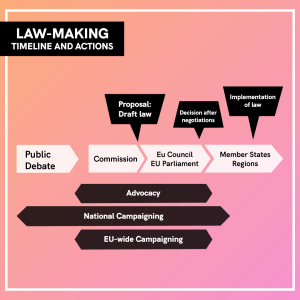How can you influence the AI Act in order to ban biometric mass surveillance across Europe?
The EU is currently negotiating the Artificial Intelligence (AI) Act. This future law offers the chance to effectively ban biometric mass surveillance. This article aims to offer an overview of how the EU negotiates its laws and the key AI Act moments in which people can make their voices heard.
Two months after Reclaim Your Face launched our European Citizens’ Initiative (February 2021), the EU proposed a new law: the AI Act. In April 2021, the draft law included a ban on some forms of biometric surveillance. Despite its shortcomings, the mere mention of the word “prohibit” in the draft law was a huge success for our campaign.
The AI Act draft showed that, if it wants, the EU has the power to truly ban biometric mass surveillance practices. As a result, we decided that the negotiations around this law will be crucial to make our Reclaim Your Face campaign demands real.
Most importantly, it showed that the calls launched by tens of thousands of people and civil society organisations across Europe since October 2020 have had a real impact.
How are EU laws negotiated?
The process of EU law-making can be difficult to grasp. The graphic below explains the role of the European Commission, the negotiations between the European Parliament and the Council of the EU, as well as the different actions we took/take during these steps.

As you can see, the European Commission (EC) is the body that proposes a new EU law. After preparatory work, the EC writes up a draft, publishes and sends it to the Parliament and the Council. Both the Parliament and the Council debate internally. As a result, each of them will form a position on the EC draft. Next, they meet – together with the EC – in a negotiation step called ‘trilogues’. Unfortunately, trilogues are notorious for their opacity and lack of opportunities for public scrutiny.
If you want to know more about where EU legislative and non-legislative Proposals come from, check EDRi’s Activist Guide to the Brussels Maze.
The role of the Parliament is crucial
The European Parliament is the only directly-elected EU body. For this reason, it is probably the body that most takes into account people’s voices. Influencing the opinion of the Parliament – before the trilogues start – is therefore a key component of civil society’s work on EU laws.
The European Parliament is formed of 705 Members (MEPs) from all 27 EU Member States. Most MEPs are also part of Parliament Committees. The Committees have a crucial role in forming the Parliament’s position.
One or more Committees are assigned to write a report that forms the basis of the entire European Parliament’s position. The AI Act is handled jointly in the Parliament by two Committees: LIBE (Civil Liberties, Justice and Home Affairs) and IMCO (Internal Markets and Consumer Protection).
Each Committee has a Rapporteur (overall lead) and several Shadow Rapporteurs (lead for their political group). The important thing to remember is that these MEPs are all key players in shaping the report of the Parliament on the AI Act. They may also be influenced by other MEPs in their Committee(s), who can suggest changes to the draft report (“amendments”) as well as the heads of their political group. See more below.

When can people strategically influence the negotiations on the AI Act?
During the negotiations of the lead committees
The lead committees in the Parliament (IMCO and LIBE) are working on their report on the AI Act up until October 2022. This means that already we should raise awareness of our work and our demands to MEPs in those two committees. What are some crucial steps of the negotiation around the LIBE–IMCO Committee report?
First, the lead Rapporteurs Benifei and Tudorache publish an IMCO–LIBE draft report (expected April 2022) which represents the parts of the position on which they could agree. Afterwards, the other MEPs in IMCO and LIBE can propose amendments to this draft report, including the areas that need more democratic scrutiny. The tabling of amendments is expected to happen until 18 May 2022.
The amendments are then negotiated among a selected number of MEPs in the LIBE-IMCO committees (the Rapporteurs and Shadow Rapporteurs), and agreed upon by coming up with compromises. The negotiations around these amendments and the agreement on a compromise text for the LIBE–IMCO report are expected to happen between May and October 2022.
After lead committees conclude their report, and just before the Plenary vote
Once out of committee negotiations, this joint IMCO–LIBE report will be presented to the full Parliament, known as the Plenary. When the report is presented to the Plenary, there is also an opportunity for last-minute amendments to the committees’ report to be put forward. This tabling of amendments before the Plenary vote is yet another moment in which MEPs may introduce protections for people against biometric mass surveillance.
After any final amendments to the IMCO–LIBE report are voted on, all 705 MEPs will vote on whether or not to accept this final version of the IMCO–LIBE report as the Parliament’s position. Currently, the 705 MEPs are scheduled to vote on the final report in November 2022.
In parallel, the Council of Member States is currently trying to make the in-principle ban on biometric surveillance from the Commission‘s draft weaker and more narrow. If the Parliament agrees on the need for a full ban on biometric mass surveillance practices, we have a chance to fight back against the Council’s proposal.
Supporters of Reclaim Your Face can play an important role in the negotiations of the EU’s Artificial Intelligence Act. Are you ready for bold, strategic and direct action? Subscribe to EDRi’s mailing list to be kept in the loop and follow our social media channels.
( Contribution by: )


